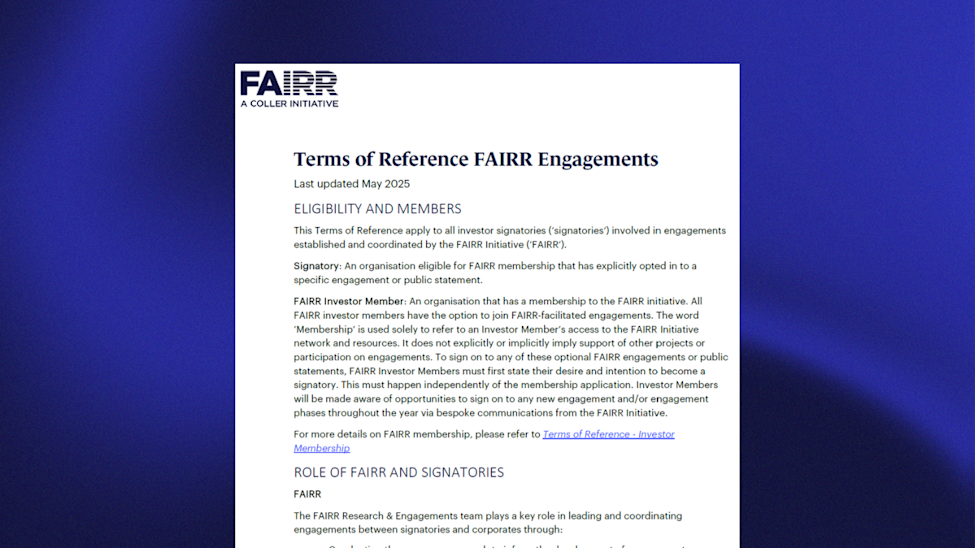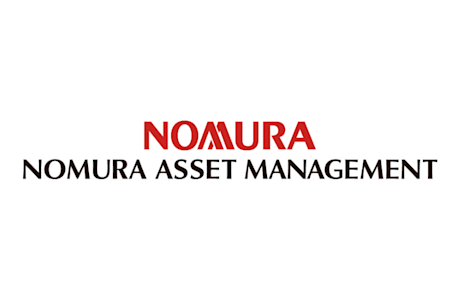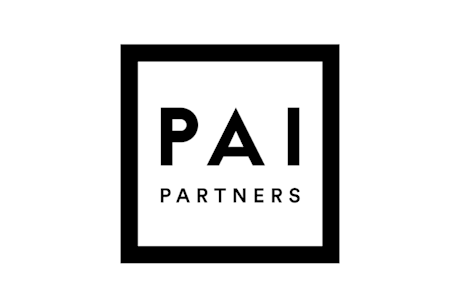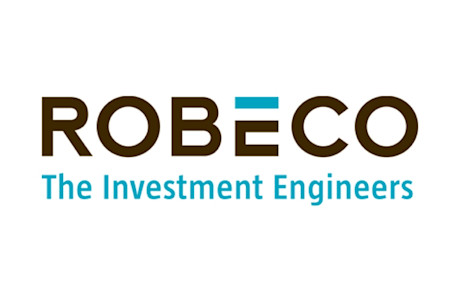
Investor Engagements
Engagement Overview
What are investor engagements?
Engagement refers to the process undertaken by an institutional investor, or a group of institutional investors, to engage in a dialogue to discuss material risks and opportunities with companies with the aim of achieving long term business resilience and sustainable value for investor portfolios.
Investors may enter into an engagement for the following reasons:
Individual investors may have limited access to companies due to the size of their holdings.
The greater the aggregate support for an issue – in number of investors and AUM – the stronger the signal it sends to both target companies and the wider market.
Knowledge building. Investors may not have the technical knowledge to launch their own engagement and want to learn from experts or other investors.
FAIRR facilitates engagements on behalf of its investor members, supporting investor stewardship or engagement teams who typically have limited capacity to engage many companies in their portfolio. The FAIRR team coordinates the process and provides administrative support.

How do engagements work?
FAIRR facilitates investor engagements for our members. FAIRR’s investor engagements provide the opportunity for dialogue around topics which contribute to long term business resilience and sustainable value of investee companies.
FAIRR’s engagements are underpinned by assessment frameworks which are informed by leading academics, industry experts, investors and corporates and those are used to measure and report on company progress.
The engagement process is structured around 4 fundamental actions:
Formal notification of companies via an engagement letter signed by supporting investors;
Formal dialogue with companies in meetings held with small group of investor representing the broader coalition;
Measuring company progress based on primary (company response to letter and meetings) and secondary (public disclosure including company websites, media, reports) data;
Reporting on progress against the engagement objective.
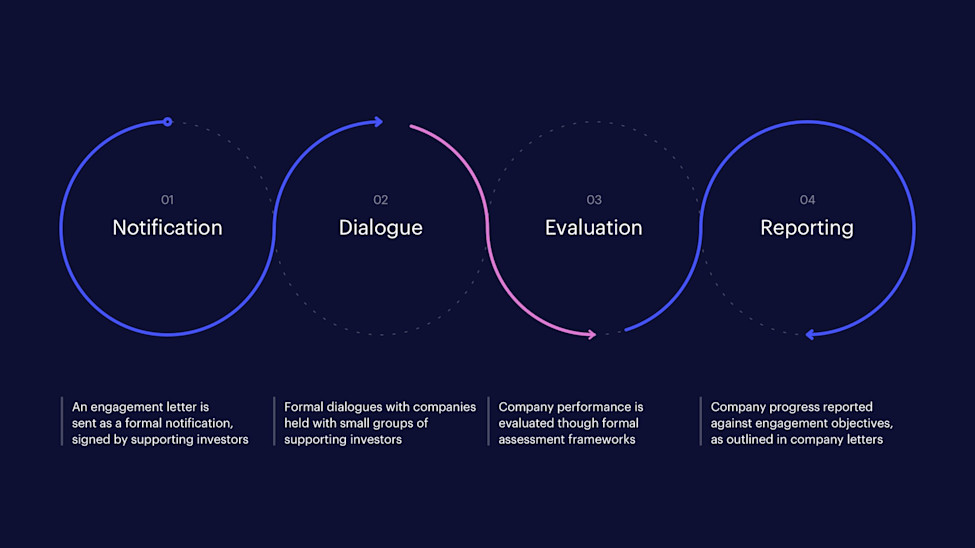
Latest Activity
Report Launch: Restaurant Antibiotics Engagement Phase 2 Progress Report
Explore key findings from Phase 2 of FAIRR’s Restaurant Antibiotics Engagement, which aimed to encourage 12 of the largest North American Quick-Service Restaurants to implement global antibiotic policies that address AMR risks across six animal protein supply chains.
Report Launch: Protein Diversification Engagement Phase 2 Progress Report
Explore key outcomes from the second year of FAIRR´s engagement, which assesses how 12 of the food retailers and 8 brand manufacturers are using protein diversification as a tool to mitigate climate, nature and health risks and build business resilience.
Report Launch: Waste and Pollution Engagement Phase 3 Progress Report
The Waste and Pollution Engagement Phase 3 Progress Report highlights the key outcomes from the final phase of this engagement, focused on how 10 meat producers and two agrochemical companies can reduce their exposure to and impacts on water quality risks from animal waste and fertiliser use.
Report Launch: Sustainable Aquaculture Phase 3 Progress Report
The Sustainable Aquaculture Phase 3 Progress Report highlights the key outcomes from the final phase of this engagement, focused on how seven major salmon producers can reduce their dependence on wild-caught fish in salmon feed and de-risk their operations.
Report Launch: Seafood Traceability Phase 1 Report
The Seafood Traceability Phase 1 Progress Report highlights the need for full-chain, digital and interoperable traceability in today’s complex and global supply chains. In the first year of this engagement, delivered in partnership with WWF US, Planet Tracker, the World Benchmarking Alliance and UNEP FI, we have assessed seven of the largest seafood producers on their traceability efforts.
Report Launch: Protein Diversification Phase 1 Progress Report
Explore the latest report, which assesses how 20 of the largest food retailers and manufacturers are diversifying their protein portfolios as a means to reduce the material risks associated with animal protein production and seize new market opportunities.
Report Launch: Waste and Pollution Phase 2 Report
Explore the latest report, which focuses on the progress made by companies in the second phase of this engagement, as well as areas where there remain significant gaps with leading practices.
Report Launch: From Farms to Forks: Antibiotic Stewardship
In May 2023, FAIRR launched two engagements; Animal Pharmaceuticals (Phase 2) and Restaurant Antibiotics (Phase 1). The engagements aim to improve transparency around how companies operating at different stages of the protein value chain are working to ensure responsible antibiotic use at the farm level.
The report highlights key findings, provides company-specific examples, and explains how companies could improve disclosure to demonstrate that they are addressing the systemic risk of AMR.
New Insight: Protein Diversification: A Tool to Address Climate, Nature, and Public Health Risks'
The overconsumption of animal protein in Western geographies is leading to adverse impacts on climate, nature, and human health. FAIRR’s new insight piece explores how transitioning to the consumption of plant-based proteins can address these three impacts.
New Report: Working Conditions Engagement Progress Update 2023/24
FAIRR’s third progress update on the Working Conditions engagement provides in-depth analysis on the performance of six global meat producers across a range of material labour risk factors and explores key industry trends. The engagement focuses on raising worker voice in corporate structures through three key themes: health and safety, fair working conditions, and worker representation.
Engagement Launch: Protein Diversification Engagement
Following six successful years of engaging companies on the need to diversify their protein portfolio, FAIRR has closed its Sustainable Proteins engagement. Building on key learnings, integrating the latest scientific guidance, and acknowledging market changes, FAIRR is pleased to launch its Protein Diversification engagement with 20 global food manufacturers and retailers.
Report Launch: Waste & Pollution Engagement
In September 2022, FAIRR launched a first-of-its-kind collaborative investor engagement aiming to drive ten global pork and poultry producers to conduct meaningful risk assessments around their management of manure and animal waste and to put in place action plans that reduce their impact on biodiversity. The Phase 1 Progress Report discusses how these companies assess the risks driven by the pollution across their value chains and also offers investors best practice examples. The report includes suggestions for follow-up engagement questions, a discussion of the potential opportunities of nutrient circularity, as well as granular data on the performance of companies against the assessment framework.
Report Launch: Antimicrobial Resistance & Antibiotic Stewardship in the Animal Pharmaceutical Industry
In May 2022, FAIRR launched a collaborative investor engagement focused on 7 global publicly-listed animal pharmaceutical companies and is supported by 65 investors representing over $17 trillion in combined assets. The aim is to drive greater disclosure and clarity over how – and if – animal pharmaceutical companies are addressing the risk of AMR throughout their value chains, from factory to farm.
To view the progress achieved in the last year, download our latest report which discusses company efforts across manufacturing, labelling, marketing and sales practices.
Current Engagements
Animal Pharmaceuticals Engagement
This engagement tackles the lack of transparency from animal pharmaceutical companies over how they manufacture, market, and sell antibiotics – practices that could contribute to AMR hotspots in the environment and drive high levels of antibiotic use.
Follow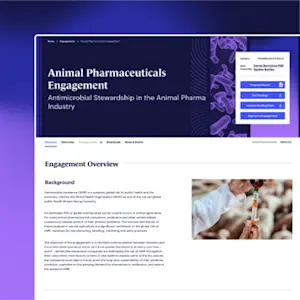
Protein Diversification Engagement
This engagement assesses 20 global food retailers and manufacturers to integrate protein diversification into climate transition plans.
Follow
Restaurant Antibiotics Engagement
This engagement addresses the quick-service restaurant sector on the need to improve antibiotic stewardship practices.
Follow
Seafood Traceability Engagement
Full-chain traceability is key to addressing ESG risks and unlocking opportunities in global seafood supply chains
Follow
Sustainable Aquaculture Engagement
Climate and Biodiversity Risk in the Farmed Salmon Industry
Follow
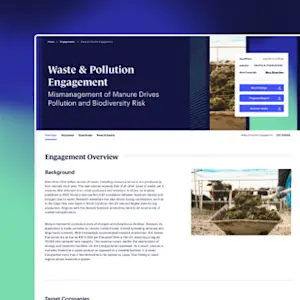

Previous Engagements
Antibiotics Stewardship Engagement
Overuse of Antibiotics in Protein Supply Chains

Meat Sourcing Engagement
Engaging six of the world’s biggest quick-service restaurant brands
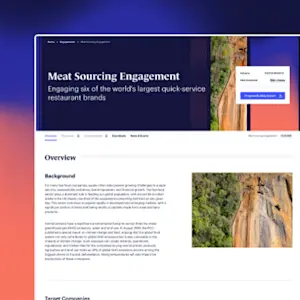
Sustainable Proteins Engagement
Assessing 23 global food retailers and manufacturers to build climate-aligned protein portfolios

Signatory Terms of Reference
Our Investor Engagement Terms of Reference applies to all investor signatories involved in our engagements established and coordinated by the FAIRR Initiative (‘FAIRR’). All FAIRR members can join FAIRR-coordinated collaborative engagements. View our Terms of Reference for FAIRR Investor Engagements below.
